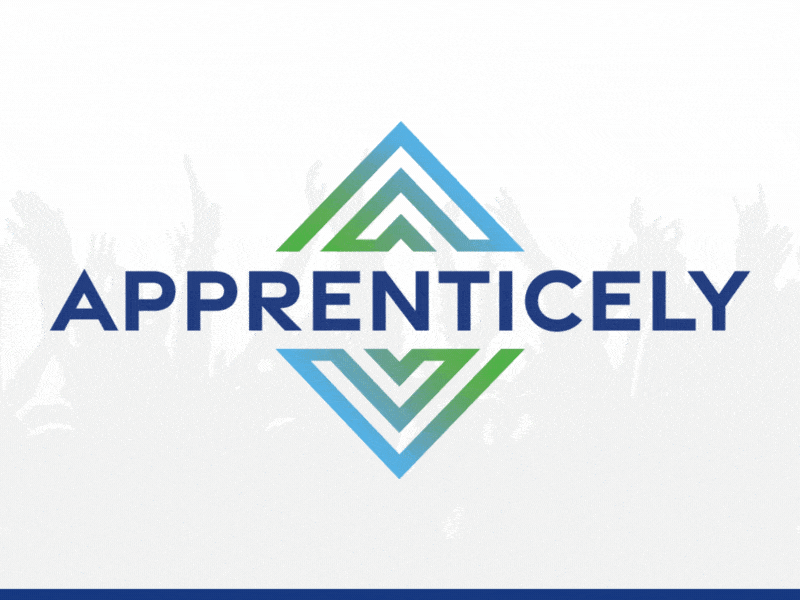ACDS REBRANDS AS “APPRENTICELY”
It’s how we do workforce
BACK IN 2018, when the Arkansas Center for Data Sciences was formed to help bridge the gap between our state’s demand for tech talent and the available supply, Registered Apprenticeships were a relatively new concept—especially for this kind of work. Most people still associated apprenticeships with “construction trade” careers such as plumbers and electricians.
Half a decade later, all that has changed. Apprenticeships have become mainstream—according to the U.S. Department of Labor, there are 641,044 active Registered Apprenticeships nationwide here in fiscal year 2024, and they span numerous industry sectors, including Manufacturing, Agriculture, Education, Energy, Financial Services, Healthcare, Hospitality, Telecom, Transportation, Information Technology, and Construction. These days, there’s hardly any occupation that can’t benefit from an apprenticeship.
Against this promising backdrop, we at ACDS are proud to announce that we’ve been tapped to facilitate Walmart’s apprenticeships in several new states in addition to Arkansas. Starting immediately, we’ll be working to buttress Walmart’s targeted career sectors in Arizona, Colorado, Texas, Missouri, Louisiana, Florida, Georgia, and South Carolina. And even though there will be absolutely no interruption of our work in legacy IT and other industry sectors here in Arkansas, we realize it’s time to rebrand ACDS for a presence across state lines. Walmart has big plans for adding huge numbers of apprentices in various occupations across eight to 10 initial states, and by year three we expect to be processing apprenticeships in nearly every state.
The growing national recognition of Registered Apprenticeships as a viable model for everything from entry-level jobs to succession planning provides a great opportunity for someone to step in and claim that space. With our proven end-to-end apprenticeship project management ability—from finding and coaching the talent, to arranging the right training, to sponsoring with the DOL on behalf of the hiring employer—we intend to be that entity. “We ask the question, ‘How do you do workforce?’” says Apprenticeship Director Lonnie Emard. “Schools do it educationally. Vendors do it technically. Companies do it professionally. Everyone tries to do it effectively. We do it Apprenticely. Not only will we capture a space using a very effective, collaborative model, but we’ve also created a word that describes how to do workforce.”
A 501(c)3 nonprofit, ACDS was launched in 2019 at the recommendation of then-Governor Asa Hutchinson’s Blue Ribbon Commission, which had been formed to devise a plan for Arkansas to capitalize on the burgeoning data analytics and computing market. “The idea,” says Executive Director Bill Yoder, “was to use the employer-driven model of Registered Apprenticeships, combining on-the-job training with related classroom instruction, to produce productive IT employees quickly. Over the past five years, ACDS has worked with 156 Arkansas employers to create 1,100 Registered Apprenticeships employing diverse Arkansans from all backgrounds. ACDS’s economic impact through new wages is well over $70 million to date.”
In light of this success in the Information Technology field, State of Arkansas leadership encouraged ACDS to apply its process to additional industry sectors, including Advanced Manufacturing, Energy, Transportation, Healthcare, and others. In 2023, ACDS began its expansion into these industry sectors. And now, in 2024, we’re taking it to the next level.
***
“I THINK WE’VE always known that, at some point, what we were doing could have a bigger impact than just IT in the state of Arkansas,” says Lonnie Emard. The seeds of this expansion were actually sown in 2021, when Walmart started looking closely at the Registered Apprenticeship program as a way to grow their own IT talent and supplement their candidate pool with diverse, non-traditional candidates. As a test, the company partnered with ACDS and the Arkansas Office of Skills Development to pilot three occupations in IT. “The success of these program implementations helped us to complete an ROI study comparing the total cost of delivery of apprenticeships in comparison to direct hire, campus hire, and experienced hire channels,” wrote Walmart’s then-Leader of Non-Traditional Talent, Gustavo Torres, in a letter to the U.S. Department of Labor Office of Apprenticeship. “The results significantly favored the Registered Apprenticeship model and has influenced our executive team and talent architecture team to propose major expansion in the use of Registered Apprenticeships for additional occupations in IT, as well as occupations across all aspects of our business.”
Walmart intends to expand what it calls “non-traditional talent” through the use of Registered Apprenticeships. As the company wrote to the DOL, “Non-traditional is a talent mobility solution that includes an ecosystem of partners (internal and external), tools, and career mobility/progression channels to unlock market share in targeted populations connecting capacity and business demand, taking in consideration speed to market, cost, and quality.” For the layman, that translates to being able to staff up quickly and cost-effectively in strategic positions, including retraining some of their existing employees for better-paying jobs. The categories they’re focusing on include occupations like Maintenance Tech, Dev Tech (heat and air), and CDL Drivers; Supply Chain for roles in Quality Assurance, Product Management, and Merchandising; and Health occupations like Optical, Pharmacy Tech, and Medical Assistants. Hiring for these occupations will take place in several locations within the eight new states. “There will be six locations for training truck drivers,” says Emard. “As for Dev Tech, they have thousands of people that they need to train. A hundred people every two weeks, for about 20 weeks a year. They’ll all come to Bentonville for two weeks of training, then go back out to their states.”
It is a big challenge for Apprenticely, which at this writing boasts a staff of 14 people. “We’ll soon have a Bentonville-based team of three devoted totally to Walmart,” says Bill Yoder. “We’ll also be hiring point people who speak the specific language of each energy sector. The most critical role will be project management, so we’ll be adding project managers. Finally, we probably won’t be doing the talent management that we’ve traditionally done here in Arkansas. These other states will have their own ways of working with their own populations, some more effectively than others.”
“For example,” Emard says, “Florida has 22 workforce boards, so they really do have kind of an existing talent infrastructure. The bottom line is, we’ll have different models for how we interact with these states—where they’re weak, we’ll fill in. There won’t be a one-size-fits-all. We’ll be the hub to help all of them in different ways.”
This concept of building a coalition of states to support Walmart began months ago when representatives from Walmart shared their workforce “demand signal” and identified certain states where they needed to focus. ACDS and the Office of Skills Development met with OA Director John Ladd and Assistant Director Megan Baird to understand possible options for creating this national hub. Our direction became much clearer when the recent Apprenticeship Building America ABA Round 2 Grant solicitation came out and clearly defined a “Hub.” Apprenticely submitted a proposal demonstrating a strong coalition to support national program expansion.
Challenges and opportunities come together, of course, and this challenging new phase brings significant future opportunity. “The metaphor that comes to my mind involves the Vanderbilts and others who built the railroads in the early 1800s,” says Yoder. “They didn’t start laying those tracks from city to city hoping there would be demand. They knew there would be demand. It was clearly a more efficient way of transporting goods from where they were manufactured to where they needed to be used. In the same way, we’re not building a national apprenticeship hub in the hope that there will be demand. We’re building it because Walmart is going to add thousands of apprentices in the coming years. And because other companies will see that this model is working for Walmart, so why not for them? And Apprenticely will be there.”

